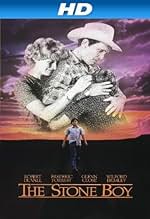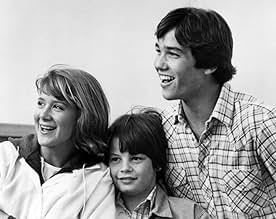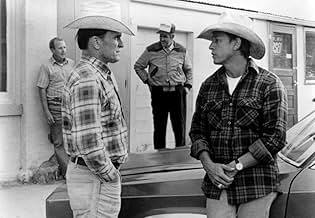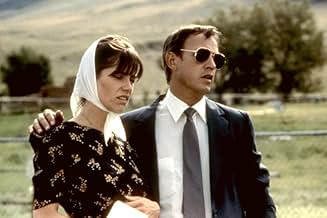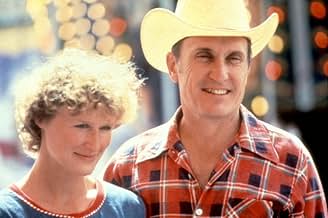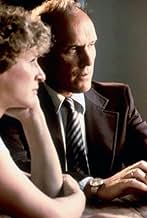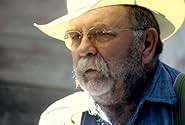अपनी भाषा में प्लॉट जोड़ेंA Midwestern farm family faces major emotional adjustment after a tragedy results in the death of an older brother.A Midwestern farm family faces major emotional adjustment after a tragedy results in the death of an older brother.A Midwestern farm family faces major emotional adjustment after a tragedy results in the death of an older brother.
- पुरस्कार
- 2 कुल नामांकन
Susan Rinell
- Nora Hillerman
- (as Susan Blackstone)
फ़ीचर्ड समीक्षाएं
"The Stone Boy" is very well acted (after all, it stars the likes of Robert Duvall, Glynn Close and Wilfred Brimley)..however, it's far from being a crowd pleaser. This is because the film is extremely depressing and it's not the type film most folks would want to watch. This certainly would help to explain the film's horrendous box office return...and it was almost immediately pulled from theaters and placed on video.
The story is about a family's reaction to the accidental death of the oldest son. It seems he and his younger brother were going out hunting and the gun accidentally discharged...killing him instantly. But the reactions are not just the surviving son's but the entire family. It reveals that there were certainly some problems pre-existing in the family. The story has a very stark look with little incidental music.
Overall, an unpleasant film with some very fine acting...and it's a movie you might want to avoid if you are dealing with depression or family crises of your own.
By the way, if you are looking for a great film dealing with some similar themes, try "Ordinary People"...it's really a great, great film and really deserved the Oscar it received for Best Picture.
The story is about a family's reaction to the accidental death of the oldest son. It seems he and his younger brother were going out hunting and the gun accidentally discharged...killing him instantly. But the reactions are not just the surviving son's but the entire family. It reveals that there were certainly some problems pre-existing in the family. The story has a very stark look with little incidental music.
Overall, an unpleasant film with some very fine acting...and it's a movie you might want to avoid if you are dealing with depression or family crises of your own.
By the way, if you are looking for a great film dealing with some similar themes, try "Ordinary People"...it's really a great, great film and really deserved the Oscar it received for Best Picture.
This movie probably never made a blip on the radar screen, but it's got quite a bit of quality. It's pretty lifelike, yet you think "It's only a movie." Duvall and Close portray common people, and you'd never even realize they are now big-name actors. It seems that the jerk in this story is a little too old to be chasing Eugene's girlfriend, but I guess it's possible. It seems unlikely that the kid would travel from Montana to Nevada by himself, but I guess it's possible. You might think that the family troubles in this movie would never happen in your own family, but I guess it's possible. I remember Glenn Close saying something like "You think the work you do is the hardest part of your life, but it isn't."
On a superficial level "The Stone Boy" could be seen almost as "Ordinary People" but on a rural setting. Trade the accidental drowning for a
hunting accident but again we have an exemplary older brother dying and leaving a younger one feeling the pains of it all, and again each member of
the family tries to cope with themselves during grief and afterwards. Extend the number of family members, add a series of situations, and remove
the shrink character and you have a confusing and emotionally drained film that somehow hits some right notes. You can learn from it, specially if
paying attention to all the mistakes the characters make throughout the picture.
Jason Presson is Arnold, the boy from the title, and he enters into a very withdrawn and quiet mode after accidentally shooting his older brother during a duck hunting. Then we have the parents, where the mother (Glenn Close) tries to console him in her careful way as the father (Robert Duvall) just avoids him, prefering to leave the boy spend some time with his grandfather (Wilford Brimley). The little sister facing her early teens is unimportant, for them and for us as we don't get to see any personal crisis of hers. And if those folks weren't enough, there's the uncle (Frederic Forrest), who cheates on his pregnant wife while consoling the dead man's girlfriend and he blames the infidelity on poor Arnold.
Lots of people around yet Arnold's is all alone. It's no mystery why he doesn't talk much with anyone or even why it takes some time before he finally break down and cry. The hardness of that rural environment keeps everybody at a certain sense of composure that they have to endure everything. Everybody's all emotional unavailable except when there's some conflict involved, and deep down they would leave that house, that town and go find themselves somewhere else, apart from everything and everyone they know. They can't find ways of dealing with themselves.
But there's some comfort. The best scenes of "The Stone Boy" revolved on Arnold and his grandfather. Most people see those things happening in reality and most movies as well, about the generational arc that skips the parents and unites the oldest with the youngest in amazing ways.
They connect just fine and that's where you see the most tender and most comprehensive parts of the story where you end up caring for them, and ignoring everyone else. The duo can count on each other while the rest are trying and failing to keep a family together. It gets to such a critical point that a total stranger (Linda Hamilton) becomes a helpful listener to Arnold's pain - best scene in the movie, I think.
It's not much of a heartwarming film, neither a painfully depressive one. It swings between those modes but not entirely to the point of causing some pain or bringing some tears - the characters are so detached at times that for a while you're not invested on them. I brought "Ordinary People" to the discussion for a reason, specially if we consider the one character who tried to mend things for the depressed teen yet there's none similar in here: the psychatrist. Obvious that Arnold's case should be accompanied by a therapist, even someone in the field should attend his questioning by the police (a terrible scene that might look unbelievable to some). How on earth those parents feel they can solve everything with distancing and controlling/supression of emotions. It happens, I know, and perhaps one of the reasons the film doesn't flunk is because seeing a different and unusual perspective one can see the validation (or not) of those parents approach in dealing with grief, loss and getting back to some normalcy.
A fine cast was assembled by Christopher Cain, with some nice performances but seeing young Presson and veteran Brimley together was one of those sparkling moments that elevated the film's quality to a memorable degree. I might forget the picture, but I won't forget their scenes. 6/10.
Jason Presson is Arnold, the boy from the title, and he enters into a very withdrawn and quiet mode after accidentally shooting his older brother during a duck hunting. Then we have the parents, where the mother (Glenn Close) tries to console him in her careful way as the father (Robert Duvall) just avoids him, prefering to leave the boy spend some time with his grandfather (Wilford Brimley). The little sister facing her early teens is unimportant, for them and for us as we don't get to see any personal crisis of hers. And if those folks weren't enough, there's the uncle (Frederic Forrest), who cheates on his pregnant wife while consoling the dead man's girlfriend and he blames the infidelity on poor Arnold.
Lots of people around yet Arnold's is all alone. It's no mystery why he doesn't talk much with anyone or even why it takes some time before he finally break down and cry. The hardness of that rural environment keeps everybody at a certain sense of composure that they have to endure everything. Everybody's all emotional unavailable except when there's some conflict involved, and deep down they would leave that house, that town and go find themselves somewhere else, apart from everything and everyone they know. They can't find ways of dealing with themselves.
But there's some comfort. The best scenes of "The Stone Boy" revolved on Arnold and his grandfather. Most people see those things happening in reality and most movies as well, about the generational arc that skips the parents and unites the oldest with the youngest in amazing ways.
They connect just fine and that's where you see the most tender and most comprehensive parts of the story where you end up caring for them, and ignoring everyone else. The duo can count on each other while the rest are trying and failing to keep a family together. It gets to such a critical point that a total stranger (Linda Hamilton) becomes a helpful listener to Arnold's pain - best scene in the movie, I think.
It's not much of a heartwarming film, neither a painfully depressive one. It swings between those modes but not entirely to the point of causing some pain or bringing some tears - the characters are so detached at times that for a while you're not invested on them. I brought "Ordinary People" to the discussion for a reason, specially if we consider the one character who tried to mend things for the depressed teen yet there's none similar in here: the psychatrist. Obvious that Arnold's case should be accompanied by a therapist, even someone in the field should attend his questioning by the police (a terrible scene that might look unbelievable to some). How on earth those parents feel they can solve everything with distancing and controlling/supression of emotions. It happens, I know, and perhaps one of the reasons the film doesn't flunk is because seeing a different and unusual perspective one can see the validation (or not) of those parents approach in dealing with grief, loss and getting back to some normalcy.
A fine cast was assembled by Christopher Cain, with some nice performances but seeing young Presson and veteran Brimley together was one of those sparkling moments that elevated the film's quality to a memorable degree. I might forget the picture, but I won't forget their scenes. 6/10.
Both Robert Duvall and Glenn Close played their roles with such believability, I simply cried. Glenn Close's role as Ruth, showed her wanting to deal with the situation, but she was under the domination of her husband. "Let him think about what he did," Robert Duvall's character, Joe, said staunchly. The story depicted a rural family dealing with an accidental death of a son by his brother, called "The Stone Boy," meaning he was so distraught and overwhelmed by what he did, he became emotionally paralyzed. Then towards the end when Jason Presson's character, Arnold, let it all out to a stranger, I was so broken hearted for him, that I actually thought of some of the terrible things that I did in my life. I personalized and identified with his character. Frederick Forrest's and Gail Youngs' roles, did NOT add not much to the film. I thought of Frederick Forrest, who played Ruth's antagonistic, womanizing brother, Andy, as a jerk who did nothing to try to help the situation. His wife, Lou, played by Gail Youngs, acted like a crazy-lady smacking Arnold around out of frustration with her own problems without pity and blaming him for her troubles. I could NOT really feel sorry for these two. Though Lou tried to keep her marriage together, she was unsuccessful. Both did NOT deal with their problems effectively. They really did NOTHING for the film and were totally ridiculous. Wilfred Brimley's minor role as the grandfather was, touching for he was the only character that showed Arnold any attention. I felt his role should have been elaborated. The players were just doing what they felt was adequate and sufficient. However, I really liked the ending so much, I actually smiled and cried tears of joy. I felt good. The Hillermans were a family again. I actually wanted to be a part of this family. They were so realistic.
I had seen this film way back in the 80's and had nearly forgotten it when I noticed it was on tv again and watched it. I remembered having liked this little sleeper when I first saw it, and I liked it even better on second viewing.
All of the actors, especially Robert Duvall, Glenn Close, Wilfred Brimley, Frederic Forrest, and Jason Presson (as the twelve-year-old boy who feels responsible for the accidental shooting death of his older brother), are superb. The film has a very genuine feel to it--an understated, quiet, deeply moving story of a family aching with grief. The dialogue is sparse but telling, and the nonverbal acting is outstanding. Sort of like a simpler, rural version of Ordinary People sans psychiatrist but equally impressive family dynamics.
The Stone Boy is well worth the time and emotional energy involved in watching it.
All of the actors, especially Robert Duvall, Glenn Close, Wilfred Brimley, Frederic Forrest, and Jason Presson (as the twelve-year-old boy who feels responsible for the accidental shooting death of his older brother), are superb. The film has a very genuine feel to it--an understated, quiet, deeply moving story of a family aching with grief. The dialogue is sparse but telling, and the nonverbal acting is outstanding. Sort of like a simpler, rural version of Ordinary People sans psychiatrist but equally impressive family dynamics.
The Stone Boy is well worth the time and emotional energy involved in watching it.
क्या आपको पता है
- ट्रिवियाAccording to the American Film Institute's AFI Catalog, ''thirteen-year-old newcomer Jason Presson earned critical praise for his performance in the title role, receiving a prize from the Academy of Family Films and Family TV, a Best Actor nomination from Youth In Film, and a four-picture deal at Paramount Pictures. When Twentieth Century-Fox elected not to promote the picture for the Academy Awards, Jason's father, Ron Presson, organized a campaign for his son's nomination, financing screenings and full-page advertisements in the trades. Presson clarified in a 17 Feb 1985 LAT editorial that he did not publicize whether the role was for 'Best Actor' or 'Best Supporting Actor', believing the performance could qualify for either category. Despite these efforts, however, no Oscar nomination resulted.''
- गूफ़When Nora and George talk at the fence, Nora's arm is on the fence when seen from behind, while from the front, she is swinging her arm.
- भाव
Andy Jansen: Days are years and years are days when it comes to sorrow. There ain't no such thing as time. It's the way it is.
- इसके अलावा अन्य वर्जनOne ending to this movie had the boy reuniting with his father by quietly slipping up next to him at the county fair, another ending had the boy reunited with his parents when they found him distraught by the loud banging of fireworks at the county fair, reminding him of the death of his brother.
टॉप पसंद
रेटिंग देने के लिए साइन-इन करें और वैयक्तिकृत सुझावों के लिए वॉचलिस्ट करें
- How long is The Stone Boy?Alexa द्वारा संचालित
विवरण
- रिलीज़ की तारीख़
- कंट्री ऑफ़ ओरिजिन
- भाषा
- इस रूप में भी जाना जाता है
- Каменный мальчик
- फ़िल्माने की जगहें
- मोंटाना, यूएसए(locations: Cascade and Great Falls in Cascade County)
- उत्पादन कंपनियां
- IMDbPro पर और कंपनी क्रेडिट देखें
बॉक्स ऑफ़िस
- बजट
- $25,00,000(अनुमानित)
- US और कनाडा में सकल
- $2,61,033
- दुनिया भर में सकल
- $2,61,033
इस पेज में योगदान दें
किसी बदलाव का सुझाव दें या अनुपलब्ध कॉन्टेंट जोड़ें



